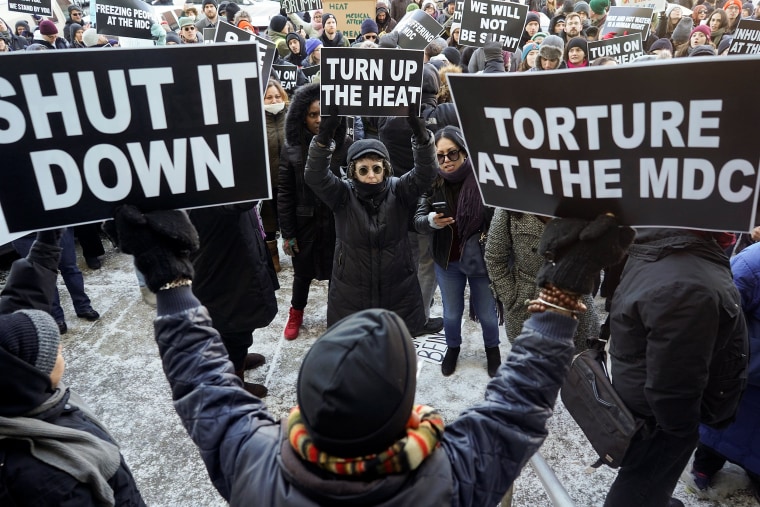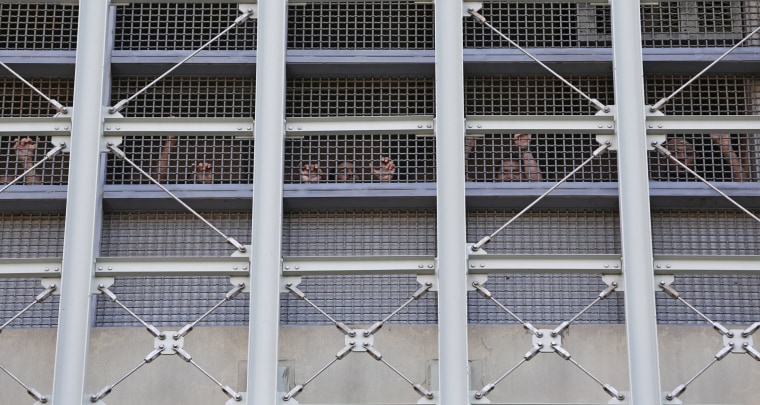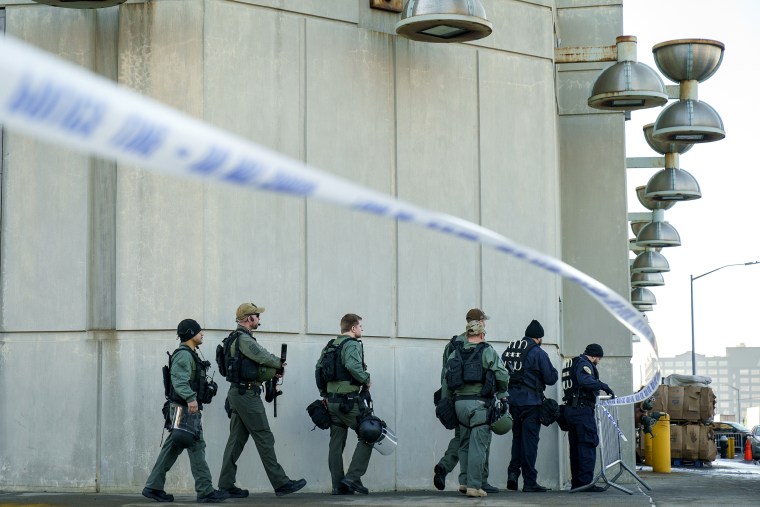The sound of inmates banging on the windows of their freezing cells to protest the lack of heat, captured by reporters in America’s biggest media market, helped draw national attention to conditions at a federal jail in Brooklyn this week.
But defense lawyers, prisoner advocates and union officials say the crisis should serve as a warning that shoddy maintenance and substandard conditions plague not just the Brooklyn Metropolitan Detention Center, but many of the 122 lockups across the country run by the Federal Bureau of Prisons.
“This is chronic,” said Eric Young, president of the American Federation of Government Employees' Council of Prison Locals, which represents federal prison workers. "Many of those facilities are in disrepair. This requires a great deal of attention and often goes neglected.”
At the high-rise Houston Federal Detention Center, for example, malfunctioning elevators bring operations in the seven-story building to a halt at least once a month and force staff to put inmates on lockdown, said Reynaldo Osorio, a correctional counselor and president of the local union chapter.
Balky air conditioning systems often leave the jail hot and humid during the summer, he said.
Jail administrators have asked their regional office for money for long-term repairs to the 30-year-old building, but there is not enough in the Bureau of Prisons budget to accommodate them, with facilities with more pressing needs being a higher priority, Osorio said. "Other institutions are older. And we’re only one of 100 something institutions throughout the bureau."
The Houston Federal Detention Center's spokesperson did not immediately respond to a request for comment.
The bureau's federal jail in Manhattan, the Metropolitan Correctional Center New York, also has a history of complaints about conditions, including vermin infestation and inoperable toilets, according to the New York news website Gothamist.
And at a federal prison in Mendota, California, the head of the local union has gone public with complaints of mold sickening workers and a malfunctioning air conditioning system.
Representatives of the Manhattan jail and Mendota prison did not immediately respond to a request for comment.
“These are pretty serious situations that, when ignored, you get the MDC Brooklyn,” Young said.
The Brooklyn Metropolitan Detention Center, which predominantly houses people accused of crimes who are unable to post bail and have not yet gone to trial, suffered a small electrical fire Jan. 27 in a second-floor control room, according to the New York Fire Department. The Bureau of Prisons said the fire caused power outages in one of its buildings that houses male inmates. A new electrical panel was installed nearly a week later, on Feb. 2.
In the interim, New York suffered a cold snap in which temperatures dropped as low as 3 degrees. The bureau said in a statement that heating was not affected by the outage. But defense lawyers and union officials ─ as first detailed in The New York Times ─ reported dark, frigid conditions in some parts of the jail that forced curbs on visits and phone calls.
Inmates’ relatives began protesting outside the jail. Inmates responded by banging on the inside of their windows, the clangs and thuds reverberating in the street below. New York City Mayor Bill de Blasio and numerous other elected officials expressed outrage at the conditions in the jail.

The Bureau of Prisons said Sunday night that power had been restored and the jail would try to resume normal operations. "The BOP is conducting a complete and thorough review of the situation in coordination with the Department of Justice," the agency said in a statement.
A representative of the Metropolitan Detention Center did not respond to a request for comment.
The Federal Defenders of New York, a nonprofit that represents people who can't afford a lawyer, filed a lawsuit Monday alleging a “humanitarian crisis” in the jail and accusing the bureau of making “misleading” statements about it. A judge ordered the jail to start allowing attorney visits.
Young traveled to Brooklyn on Monday to tour the detention center. He said officials told him it would be a year before the fire-damaged electrical panel would be fully rebuilt.
The conditions at the Brooklyn jail, as reported by defense lawyers and union officials, opened a window on problems in American jails and prisons that are often kept out of the public eye, inmate advocates said.
“This could be happening more frequently and we’re just not hearing about it,” said David Fathi, head of the American Civil Liberties Union’s National Prison Project, which raises issues of substandard care in prisons and jails. “This happened in the nation’s largest urban area with lots of lawyers going in and out, and had the visibility others don’t.”
With no agency that investigates and reports on conditions in federal prisons and jails, the bureau “operates in the shadows with very little public oversight,” Fathi said. He also blamed the Prison Litigation Reform Act, passed in 1996, which curtailed inmates' ability to sue prisons.
At the same time, Bureau of Prisons facilities have suffered from a lack of funding for upkeep and repair, union officials say.
The bureau warned in its 2019 budget request to Congress that 43 percent of its buildings were more than three decades old, but over the last 10 years it had received less than half of what it needed to maintain them. As a result, the bureau said it devotes its "modernization and repair" budget to only its highest priority projects.
The bureau asked for $99 million for modernization and repair, a bit less than its 2018 request but more than it has received in any year since 2009.
"Failure to maintain the BOP’s structures and utility systems inhibits BOP’s ability to maintain safe and humane institutions," the budget request said.

Betsy Ginsberg, director of the Civil Rights Clinic at Cardozo Law School, said that the federal prison system is often held up as "a shining example" of modern corrections — "but it's not."
She said the most troubling part of the Brooklyn situation was the "lack of attention and lack of humanity" that allowed the problems to go on for several days. She said that was a symptom of a historic lack of public scrutiny.
"That's worse than neglect," Ginsberg said. "It's not just not paying attention. They chose not to take the appropriate steps."

